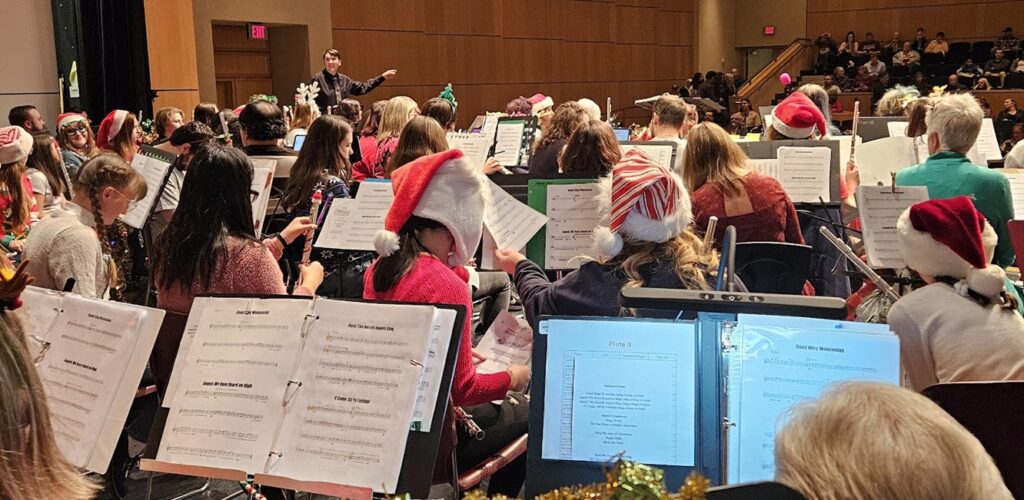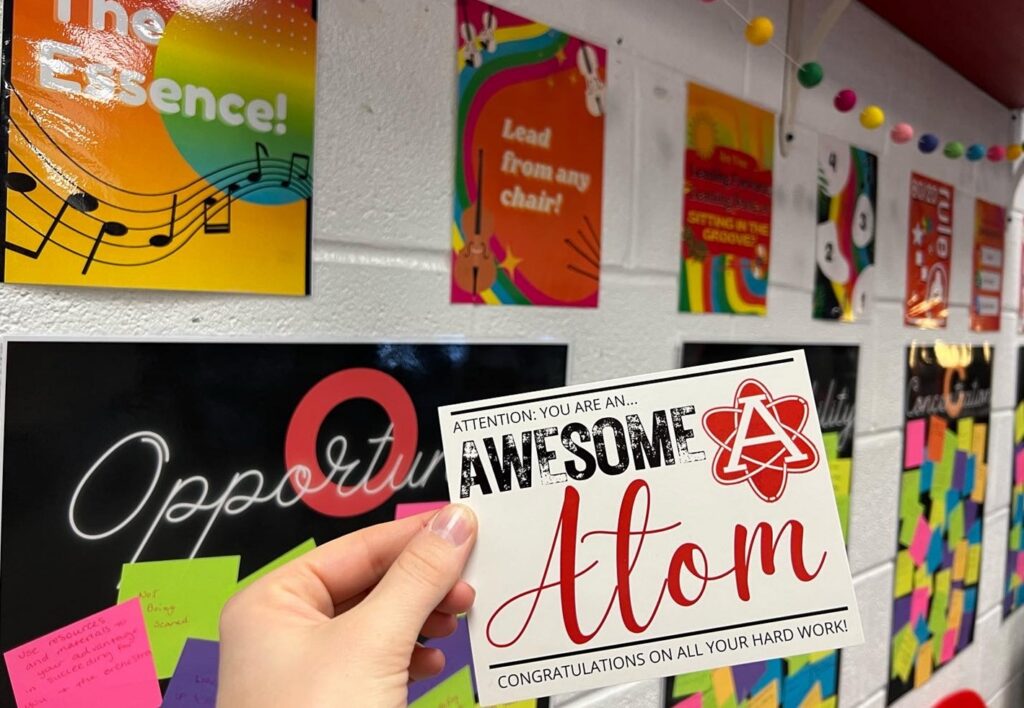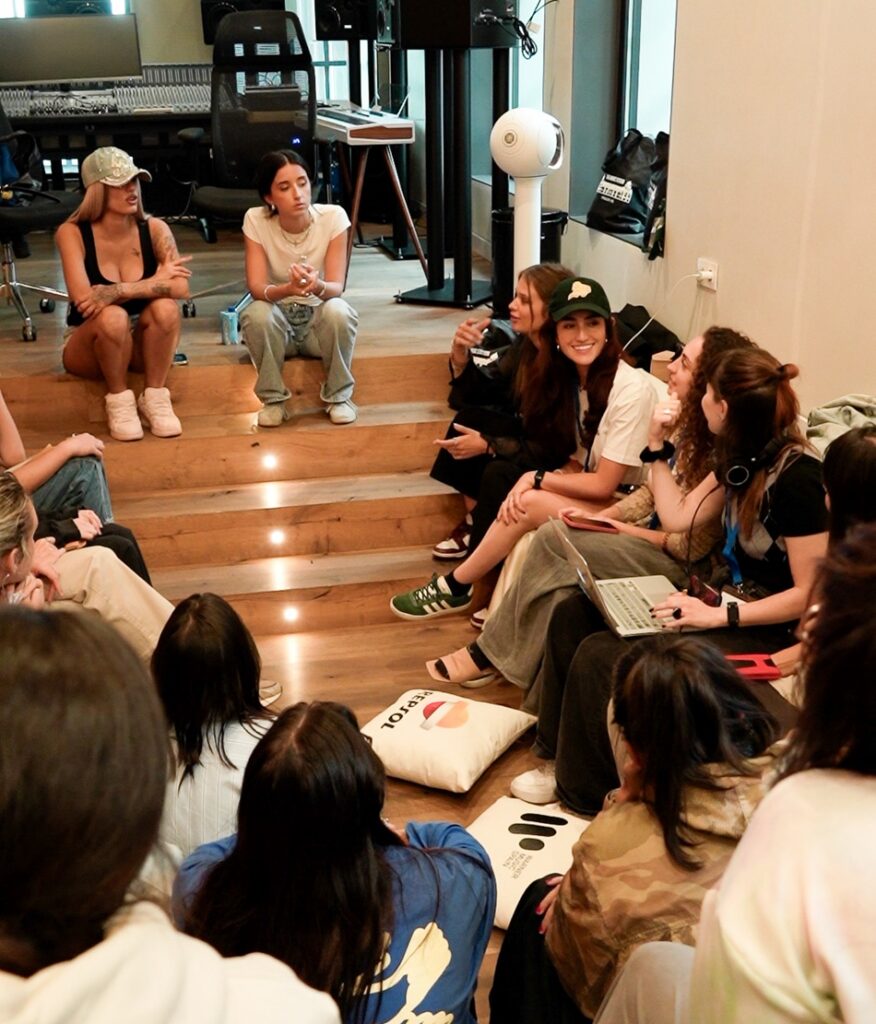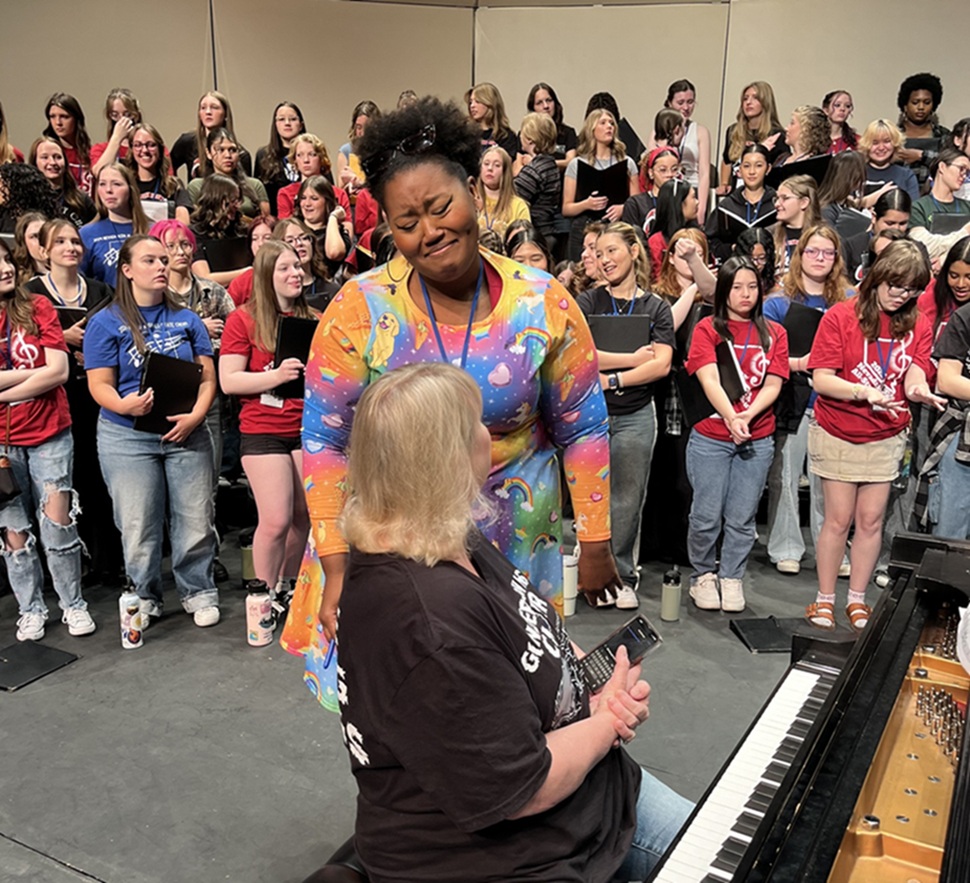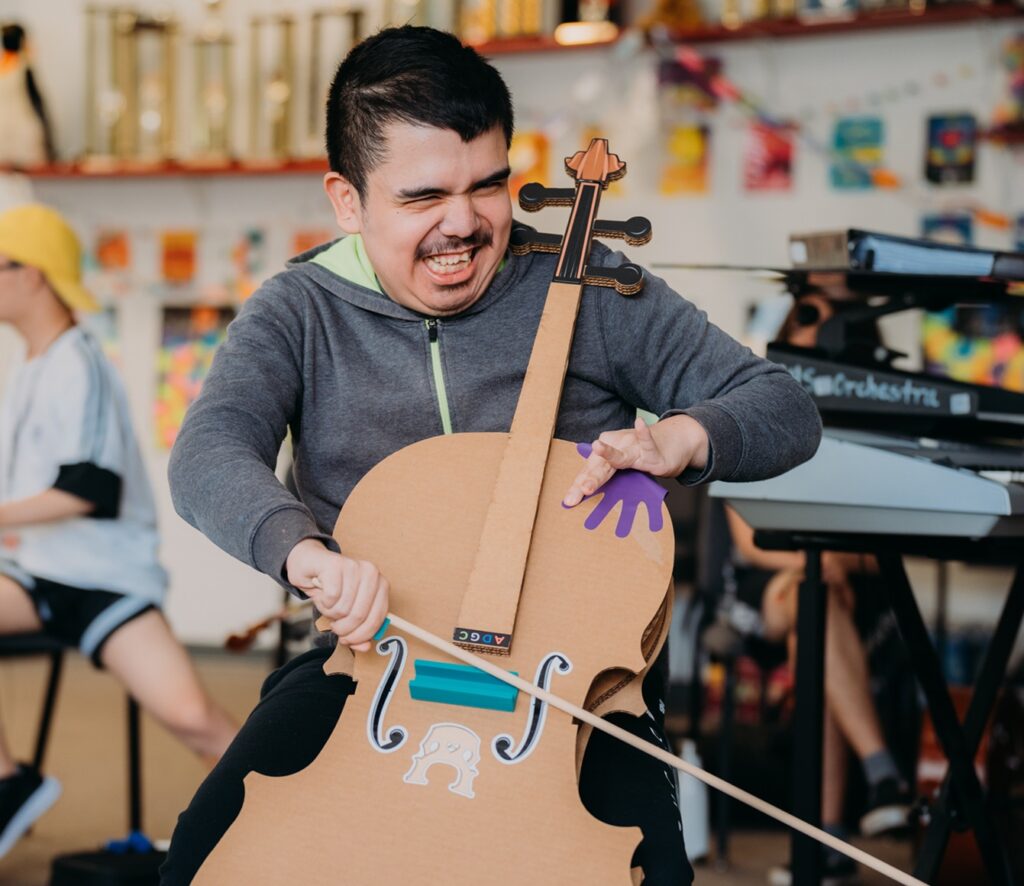Tagged Under:
A University Trumpet Studio Fosters a Culture of Community
At Stetson University, trumpet students learn to be flexible, accountable and vulnerable while honing their musical performance skills.
When Dr. Aaron J. Witek, Assistant Professor of Trumpet and head of the Trumpet Studio at Stetson University in Deland, Florida, was a college student himself, he originally dreamed of becoming a high school band director. “I joke [with my students] that I failed at my first job,” he says.
Witek completed the student teaching process, but while getting his Master’s degree, he uncovered a new passion. “I found a love for working one-on-one and mentoring students at the college level,” he says. “You never know what might take you where.”
Although he jokes about “failing” at his initial goal, Witek doesn’t regret the choices he made. He tells his students that changing career paths actually gave him a more complete perspective on what it means to be a musician and an educator. Witek learned that a musician needs to be versatile, which is a lesson he now passes down to his students. “The days of ‘my job is only this’ don’t exist anymore,” he says. “We have to be flexible … that’s what I try to do with my studio.”
Witek’s trumpet studio combines his passions for trumpet performance and collegiate music education by helping students grow into versatile, thoughtful musicians — whether their paths lead to performing, teaching or other areas of the profession. While students come to study music, he reminds them that their journeys may take them in unexpected directions. His studio emphasizes both the hard skills of musicianship and pedagogy, and the soft skills of communication, empathy and collaboration — all essential in what he believes is ultimately a people business.
This approach fits with the culture at Stetson, which made history in 1936 by opening Florida’s first collegiate music school. “I knew it had a really good reputation as a music education school,” Witek says. “I wanted to create a trumpet studio that fostered music education at its heart.”
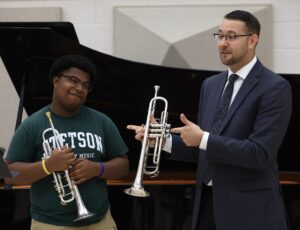
Growing the Studio
Now in his fourth year of running the Trumpet Studio at Stetson, Witek has grown the program to a full-size studio with 16 trumpet majors. The studio’s success stems from its culture of collaboration, high standards, accountability and camaraderie. “We’re all learning the principles of being great educators and great individuals,” Witek says. “I use trumpet as a tool to help people become better people.”
In the trumpet studio, growth has been a self-perpetuating cycle. As the studio’s positive culture develops, the more the program can recruit new students. “Our best recruiters are the students,” Witek says.
For outreach, Witek makes sure that students are visible at trumpet-centered events. His students perform or exhibit at events like the National Trumpet Competition and the International Trumpet Guild Conference. He also takes current students out to high schools to promote the program. In addition, Witek brings in guest artists who not only attract prospective students to attend events at Stetson but also help promote his students and the program as a whole — often returning to their own institutions and professional circles speaking positively about the quality and experiences at Stetson.
Witek offers prospective students the opportunity to come to the studio, take a lesson with him and shadow current students. He pairs potential students with current students so they can experience the studio’s culture firsthand. “Come experience the studio vibe,” he says. “Just feel what it’s like to be part of this culture.”
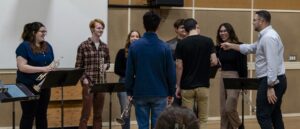
Peer Feedback
Building a welcoming culture is all about fostering collaboration among peers, both in the classroom and outside of it. “We have a lot of studio parties. We’ll get coffee or ice cream together,” Witek says. “I make sure that my students understand that my goal is to help them be great people. Through that, everything else grows.”
Witek, who was recognized as a 2025 Yamaha “40 Under 40” music educator, believes in the power of peer feedback. When he took this role at Stetson three years ago, it was during the immediate aftermath of COVID lockdowns, which kept students from engaging with one another face-to-face. He noticed that many students lacked an understanding of how to give and receive feedback in a productive way.
So, Witek began incorporating peer feedback into the learning process, along with demonstrations on how good feedback looks. “A huge part of it is teaching how to talk to each other, how to give constructive feedback in a way that isn’t pointing the finger,” he says.
To educate students in the fundamentals of feedback, Witek uses a lot of peer teaching where older students mentor younger ones. “We’ll have a senior go up to the front of the class and play, and then I’ll call on a first-year student and say, ‘Go up there! I want you to work with them,’” he says.
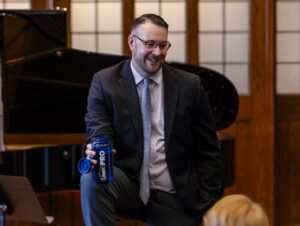
Vulnerability as a Strength
Witek also partnered with the university’s counseling center to better support his students’ well-being. Counselors often encouraged students to slow down, pace themselves and maintain a healthy work-life balance — advice that many music students tended to dismiss. Witek recognized that this guidance needed to be reframed in a way that resonated with the unique pressures of studying music.
He explains that in many music programs, students fear that if they take a break or don’t constantly push themselves, they’ll fall behind while others advance. As a result, they often feel conflicted by the common advice to “slow down, pace yourself and maintain a healthy work-life balance.” Working with the university’s counseling center, Witek developed ways to communicate and practice these concepts in a manner that resonated specifically with music students. Together, they organized an event that allowed students to openly explore and process their emotions as a group.
During the session, students sat in a circle and responded to prompts such as, “What are your greatest worries in music school?” and “How do you feel here?” They wrote their answers on cards and took turns sharing them aloud. “Everyone felt the same things: I don’t belong. It’s only hard for me,” Witek recalls.
Through this shared vulnerability, students began to see that their struggles were not unique — they all experienced the same doubts and fears. This realization helped them feel a deeper sense of belonging within the program.
According to Witek, exercises like these encourage students to be more open and comfortable expressing their emotions, which in turn leads to more genuine and constructive peer feedback. “A lot of these students are away from home for the first time,” he says, “and they may not yet feel comfortable sharing their feelings. These activities help them build that trust.””
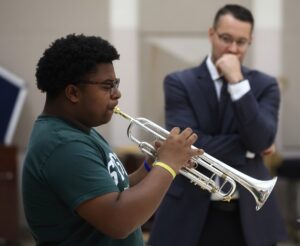
Friendly Competition
Witek says that the trumpet studio’s biggest asset is its culture, which fosters collaboration and camaraderie. However, his students, like most music students, aren’t immune to feeling competitive. Instead of trying to eliminate that competitive energy, Witek has his students use it to inspire and motivate one another.
For example, students must regularly compete against each other for solos and ensemble placements. However, Witek and his students see this as yet another opportunity to give each other feedback. “They schedule mock auditions for each other,” Witek says. “Even auditions that they’re taking against each other.”
Witek also keeps the competitive spirit friendly and collaborative by reminding students of the subjective nature of music and the importance of each person specializing within their own strengths.
“You probably wouldn’t have a trumpet player in a ska band win the New York Philharmonic principal trumpet seat,” he says. “Everyone has their strengths. We try to find where their strengths are and developing those skills, but also developing other areas of their playing so when they graduate, they’re well rounded.”
Fostering this type of community starts at the program recruitment stage. When looking for new students to join the program, Witek says that trumpet skill is third on his list of priorities. “The first thing is, who are you as a human, and how well can we work together?” he says. “Second is work ethic. If you’re willing to work hard and you have a great attitude, I can teach you.”
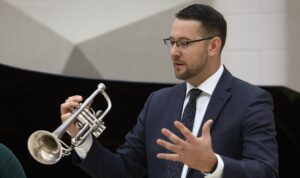
High Expectations
When naming qualities that he seeks in his students, Witek often uses the word “accountability.” For him, a student who is accountable treats the opportunity to learn seriously. “I tell my first-year students that the hardest thing about college is showing up,” he says. “It’s amazing how much trouble freshmen have just getting out of bed and going to class.”
Witek sets high standards for his students in terms of professionalism, and that starts with getting dressed in the morning. “I have a rule in my studio: you can’t wear pajamas, sweats or Crocs to your lesson,” he says. “You need to treat this like a job.”
Accountability also includes prioritizing classwork. “We have a lesson sheet just like in elementary school that lists the fundamentals I want you to focus on, exercises, the repertoire,” Witek says. “It can be overwhelming at first, but organized and helpful.”
In return for hard work and professionalism from his students, Witek offers them a safe, family-like community where their musical abilities can flourish. He makes sure students know that if they ever struggle to keep up with their course work, they can come to him for help. “I’m never going to make my students do something they don’t know how to do. If they have trouble, we’ll break down how to set [their] goals … and find what works for that student,” he says.
Though Witek has high expectations, he also considers the trumpet studio to be a family. Witek fosters this family environment in a variety of ways, from bringing his dog into the studio, to teaching his students the importance of vulnerability. “As a family, it’s important for me to be vulnerable,” he says. “As a younger teacher, I wasn’t very good with [that].”
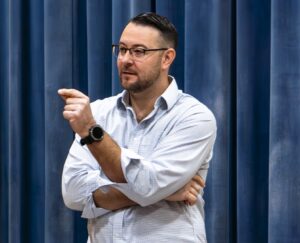
“Dr. Witek has made a powerful impact on the Stetson School of Music through his unconditional commitment to his students,” says Dr. Washington Garcia, Stetson’s Dean of the School of Music. “He has built a studio of remarkable young musicians who embody his high standards and passion for excellence. I have the utmost admiration and respect for Dr. Witek, not only for the exceptional talent he has brought to Stetson, but also for the kind and caring person he is.”
As Witek has progressed in his career, he has learned the importance of owning up to his mistakes; his accountability inspires students to do the same. “I make mistakes. I get stressed. I’ve been in their shoes … I try to be relatable because we’re all human,” he says.










